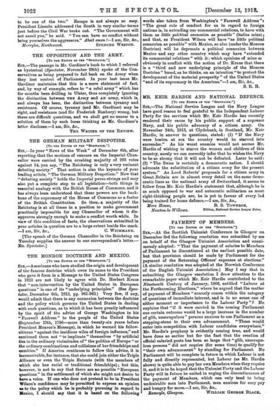THE MONROE DOCTRINE AND MEXICO.
[To THE EDITOR OF THE "SPECTATOR."] Srn,—Americans who have studied the origin and development of the famous doctrine which owes its name to the President who gave it form in a, Message to the United States Congress in 1823 are not likely to agree with Dr. Herbert Kraus that " non-intervention by the United States in European questions" is one of its "underlying principles." (See Spec- tator, December 6th, 1913, pp. 961-962.) Very few, if any, would admit that there is any connexion between the doctrine and the policy which governs the United States in dealing with such questions, as to which it has been greatly influenced by the spirit of the advice of George Washington in his "Farewell Address" to the people of the United States (September 17th, 1796—more than twenty-six years before President Monroe's Message), in which he warned his fellow- citizens " against the insidious wiles of foreign influence," and cautioned them not " to implicate " themselves " by artificial ties in the ordinary vicissitudes of " the politics of Europe " or the ordinary combinations and collisions of her friendships and enmities." If America continues to follow this advice, it is inconceivable, for instance, that she could join either the Triple Alliance or even the Triple Entente (with the members of which she has racial or traditional friendships) ; but this, however, is not to say that there are no possible "European questions " in the settlement of which she might not desire to have a voice. If one who does not pretend to be in President Wilson's confidence may be permitted to express an opinion as to the policy which he is probably pursuing in regard to Ilexico, I should say that it is based on the following words also taken from Washington's " Farewell Address ": "The great rule of conduct for us in regard to foreign nations is, in extending our commercial relations, to have with them as little political connexion as possible" (italics mine); and that, as President Wilson will have "as little political connexion as possible" with Mexico, so also (under the Monroe Doctrine) will he deprecate a political connexion between Mexico and any other country which may have "extended its commercial relations" with it: which opinions of mine as obviously in conflict with the notion of Dr. Kraus that there is a "third and new underlying principle of the Monroe Doctrine" based, as he thinks, on an intention " to protect the development of the material prosperity" of the United States "and of its supremacy in the Americas."—I am, Si:, &c.,
S. R. H.


























































 Previous page
Previous page